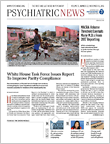“Housing first” models of care—which aim to rapidly transition someone from homelessness to independent living—have emerged as an effective way to rehabilitate those who are homeless and experiencing mental illness, substance use disorders, and/or other physical health issues.
However, the path between housing and improvement is not always straightforward, Julian Somers, Ph.D., an associate professor of health sciences at Simon Fraser University in Burnaby, British Columbia, told Psychiatric News. “It’s not enough to just spend money or provide human resources, which are limited to begin with,” he said. “We have to spend it effectively.”
To determine the housing programs that will be most beneficial to patients, Somers has been leading controlled studies of housing-first programs in the Vancouver metropolitan area since 2009. His latest study, published September 24 in Schizophrenia Bulletin, explored one of the biggest challenges in assisting homeless people with a severe mental illness such as schizophrenia—medication adherence.
A total of 165 homeless adults with schizophrenia who had recently initiated antipsychotic pharmacotherapy were randomly assigned to one of three groups: scattered-site housing (choice of a single occupancy apartment where they would receive weekly, in-home assertive community treatment [ACT] visits), congregate housing (live together with others in one complex with several on-site support services including a pharmacy), or usual care (access to shelters, meal programs, and recovery centers). The participants were then followed for an average of 2.5 years.
The goal was to see which housing model encouraged better antipsychotic adherence, as both approaches offer pros and cons; for example, scattered-site housing provides a greater sense of independence whereas congregate housing provides ready access to needed services.
At the start of the study, the participants had an average adherence rate of 48 percent (measured by medication possession ratio, which looks at the number of prescription refills made within a given time period). By study’s end, all three groups improved adherence, though the scattered-site housing participants came out on top, with an average adherence rate of 78 percent (80 percent is considered clinically adherent). Congregate-housing participants were found to be 61 percent adherent, and the usual treatment group was 55 percent adherent.
“Our results demonstrate that housing first in market rental accommodations with ACT can effectively increase antipsychotic adherence to recommended levels among people who [had been] homeless and diagnosed with schizophrenia,” the authors wrote.
Somers noted that the significantly higher antipsychotic medication adherence by participants in the scattered-site housing may be in the part the result of a change in scenery. “Besides providing individuals a say in where they live, scattered-site housing typically places them in a diverse, established community away from their old neighborhood,” he explained. “So maybe having patients leave a place associated with not taking medication and having them adapt to new societal norms can be beneficial.”
In contrast, the patients in congregate housing may have seen their environment as too similar to a housing shelter, and therefore maintained their former norms and behaviors, Somers said.
“It was somewhat counterintuitive to see limited improvement [in the group setting], especially as the group housing had an on-site pharmacy,” he continued. “But it reinforces that simply providing access to a service sometimes is not enough.”
But even though group housing proved statistically no different from usual care, Somers emphasized that these findings should not suggest a congregate housing model cannot help improve adherence.
“I think the point of these housing analyses is not to establish one type as superior to the other, but just to identify potential shortcomings that can be addressed to help improve service delivery to a population that needs it urgently,” he said.
This study was supported by the Mental Health Commission of Canada, with additional funding from the Canadian Institutes of Health Research, Imperial Order Daughters of the Empire, and Wellcome Trust. ■
“Housing First Improves Adherence to An-tipsychotic Medication Among Formerly Home-less Adults With Schizophrenia: Results of a Randomized, Controlled Trial” can be accessed
here.

